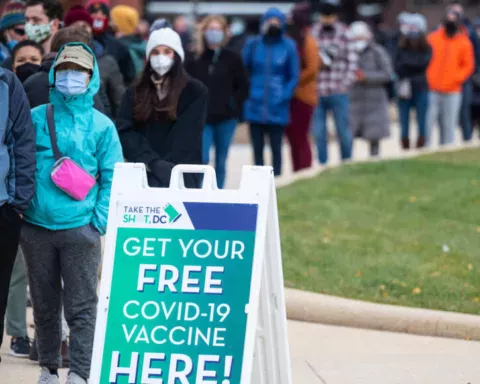Below are answers to commonly asked questions about COVID-19 vaccination. CDC also has information for busting common vaccine myths available on facts about COVID-19 vaccines.
Get answers to other frequently asked questions about:
About Vaccines
Is use Covid-19 vaccines mandated under an EUA?
No, FDA does not mandate vaccination. However, whether a state, local government, or employer, for example, may require or mandate COVID-19 vaccination is a matter of state or other applicable law.
Should I use a digital data logger to monitor storage unit temperatures?
Yes. CDC requires vaccination providers participating in the COVID-19 Vaccination Program use a specific type of temperature monitoring device (TMD) called a “digital data logger” (DDL). A DDL provides the most accurate storage unit temperature information, including details on how long a unit has been operating outside the recommended temperature range (referred to as a “temperature excursion”). DDLs using a buffered temperature probe provide the most accurate way to measure actual vaccine temperatures. Always use DDLs with a current and valid Certificate of Calibration Testing.
Note that not all DDLs can measure ultra-cold temperatures. For accurate ultra-cold temperature monitoring, it is essential to use an air-probe or a probe designed specifically for ultra-cold temperatures with the DDL.
For the Pfizer-BioNTech COVID-19 vaccine, there are additional considerations for using a TMD with the thermal shipping container. Refer to the Pfizer-BioNTech COVID-19 Vaccine Storage and Handling Summary and Pfizer-BioNTech COVID-19 Vaccine webpage for more information.Whom can I contact about a problem with COVID-19 vaccine (e.g. temperature excursion, damaged vaccine, etc.)?
If the vaccine experienced problems during shipment (e.g., damage or temperature excursion), contact:
- Directly distributed vaccine (i.e., Pfizer): contact Pfizer 800-666-7248 (option 8) or CVGovernment@Pfizer.com
- Centrally distributed vaccine (e.g., Moderna): contact McKesson Specialty Customer Services Phone (833) 343-2703 Monday – Friday, 8 a.m. – 8 p.m. ET
If the vaccine experienced problems after it has been received and placed into storage, contact the vaccine manufacturer for guidance on improper storage and handling.
For temperature excursions (out-of-range temperatures), take immediate action:
- Label the vaccine “Do Not Use” and store at the recommended temperature range until you receive manufacturer guidance.
- Document the date and length of time of the excursion, storage unit temperature, room temperature, and inventory affected.
- Record any other relevant information.
- Contact the manufacturer for guidance on whether to use affected vaccines and whether patients need to be recalled for revaccination.
- Document the event and action taken for record-keeping requirements.
Vaccine Indications
My patient has a history of Guillain-Barré Syndrome. Can I vaccinate them?
Yes. Persons with a history of Guillain-Barré Syndrome (GBS) may receive COVID-19 vaccine unless they have a contraindication to vaccination. With few exceptions, ACIP’s general best practice guidelines for immunization do not include a history of GBS as a contraindication or precaution to vaccination. Any occurrence of GBS following mRNA COVID-19 vaccination should be reported to the Vaccine Adverse Event Reporting System (VAERS).
My patient has a history of Bell’s palsy? Can I vaccinate them?
Yes. Persons with a history of Bell’s palsy may receive COVID-19 vaccine unless they have a contraindication to vaccination. Cases of Bell’s palsy were reported following vaccination in participants in both the Pfizer-BioNTech and Moderna COVID-19 vaccines clinical trials. However, the FDA does not consider these to be above the frequency expected in the general population and has not concluded that these cases were causally related to vaccination. Post-authorization safety surveillance will be important to further assess any possible causal association. In the absence of such evidence, persons with a history of Bell’s palsy may receive an mRNA COVID-19 vaccine unless they have a contraindication to vaccination. Any occurrence of Bell’s palsy following mRNA COVID-19 vaccination should be reported to VAERS.
Can pregnant people be vaccinated?
Yes. A pregnant person who is part of a group recommended to receive COVID-19 vaccine (e.g., healthcare personnel) may choose to be vaccinated. There are currently few data on the safety of COVID-19 vaccines in pregnant or lactating people. When making a decision, you and your patient should consider the
- level of COVID-19 community transmission
- patient’s personal risk of contracting COVID-19
- risks of COVID-19 to the patient and potential risks to the fetus
- efficacy of the vaccine
- side effects of the vaccine
- lack of data about the vaccine during pregnancy
Can lactating people be vaccinated?
Yes. A lactating person who is part of a group recommended to receive a COVID-19 vaccine (e.g., healthcare personnel may choose to be vaccinated. There are no data on the safety of COVID-19 vaccines in lactating people or the effects of mRNA COVID-19 vaccines on breastfed infant or milk production/excretion. mRNA vaccines are not thought to be a risk to the breastfeeding infant.
Can COVID-19 vaccine be given to persons with a history of SARS-CoV-2 or COVID-19 disease?
Yes. Vaccination should be offered to eligible persons regardless of whether they have a history of prior symptomatic or asymptomatic SARS-CoV-2 infection. Data from clinical trials indicate that mRNA COVID-19 vaccines can be safely administered in persons with evidence of prior SARS-CoV-2 infection.
Vaccination of persons with known current SARS-CoV-2 infection should be deferred until the person has recovered from acute illness (if the person had symptoms) and until criteria have been met for them to discontinue isolation. This recommendation applies to any vaccine, including the first and second doses of COVID-19 vaccine. Additionally, if a person was infected within the last 90 days, they may defer vaccination until after a 90-day period or if they were treated with monoclonal antibodies or convalescent plasma within the last 90 days vaccination should be deferred.
Yes, but vaccination should be deferred for at least 90 days after they received treatment. Based on the estimated half-life of monoclonal antibodies or convalescent plasma as part of COVID-19 treatment, as well as evidence suggesting that reinfection is uncommon in the 90 days after initial infection, delaying vaccination for 90 days is a precautionary measure until additional information becomes available, to avoid interference of the antibody treatment with vaccine-induced immune responses.
My patient is on immunosuppressing drugs. Can they be vaccinated?
Immunocompromised individuals may receive COVID-19 vaccination if they have no contraindications to vaccination. However, they should be counseled about the
- unknown vaccine safety profile and effectiveness in immunocompromised populations
- potential for reduced immune responses
- need to continue to follow all current guidance to protect themselves against COVID-19
For persons who were vaccinated for COVID-19 while they were undergoing chemotherapy or treatment with other immunosuppressive drugs and who have since regained their immune competence, re-vaccination is not recommended at this time. Recommendations on re-vaccination or additional doses of mRNA COVID-19 vaccines may be updated as additional information is available.
Immunocompromised individuals may receive COVID-19 vaccination if they have no contraindications to vaccination. However, they should be counseled about the
- unknown vaccine safety profile and effectiveness in immunocompromised populations
- the potential for reduced immune responses
- need to continue to follow all current guidance to protect themselves against COVID-19
Either of the currently authorized mRNA COVID-19 vaccines can be used when indicated; the Advisory Committee on Immunization Practices (ACIP) does not state a product preference.
For persons who were vaccinated for COVID-19 while they were undergoing chemotherapy or treatment with other immunosuppressive drugs and who have since regained their immune competence, re-vaccination is not recommended at this time. Recommendations on re-vaccination or additional doses of mRNA COVID-19 vaccines may be updated as additional information is available.
Vaccine Administration
What is the proper route and site for vaccine administration?
Intramuscular injection is the recommended route for all COVID-19 vaccines.
The recommended site to administer an intramuscular injection to an adult is the deltoid muscle. Refer to the following job aids for identifying administration sites:
- Vaccine Administration: Intramuscular (IM) Injection Adults 19 years of age and older
- Vaccine Administration: Intramuscular (IM) Injection Children 7 through 18 years of age
- HCP | Vaccine Administration | Resource Library | CDC (includes demonstration videos for intramuscular injections)
What needle length and gauge should I use?
Needle gauge and length recommendations vary based on age, gender, and weight. Use CDC’s Vaccine Administration: Needle Gauge and Length job aid to help you determine the appropriate gauge and length. A discussion of vaccine administration best practices can be found in the Vaccine Administration chapter of the Epidemiology and Prevention of Vaccine-Preventable Diseases (Pink Book).
Do I have to aspirate before giving COVID-19 vaccine?
No. You should not aspirate before giving any vaccine, including COVID-19 vaccines. Aspiration can increase pain because of the combined effects of a longer needle-dwelling time in the tissues and shearing action (wiggling) of the needle. A discussion of vaccine administration best practices can be found in the Vaccine Administration chapter of the Epidemiology and Prevention of Vaccine-Preventable Diseases (Pink Book).
The Pfizer-BioNTech and Moderna COVID-19 vaccines are not interchangeable with each other or with other COVID-19 vaccine products. It is recommended that persons initiating the series with one COVID-19 vaccine complete the series with the same product. However, if two doses of different mRNA COVID-19 vaccine products are inadvertently administered, no additional doses of either product are recommended at this time.
Some steps you can take at the appointment for the first dose:
- Complete COVID-19 vaccination record cards with accurate vaccine information, give them to each vaccine recipient, and encourage recipients to keep the card (this is required).
- Record each recipient’s vaccination in your state’s immunization information system (IIS) within 72 hours.
- Record administration information in the patient’s medical record.
- Make an appointment for the second dose BEFORE the recipient leaves.
Some steps you can take to prepare for the second-dose appointment:
- Provide a reminder (when a dose is due) or recall (when a dose is missed). Reminders might be generated via electronic medical record, IIS, or v-safe. Learn more about v-safe.
- Ask all vaccine recipients to bring their COVID-19 vaccination record cards to their second-dose appointment during the first-dose appointment and when sending appointment reminders.
- Check your state’s IIS for COVID-19 vaccination records. All COVID-19 vaccination providers are required to report data within 72 hours of administering a COVID-19 vaccine.
CDC does not recommend predrawing vaccine. If vaccine must be predrawn:
- Set up a separate administration station for each vaccine type to prevent medication errors.
- Draw up vaccines only after arriving at the clinic site or mass vaccination event.
- Each person administering vaccines should draw up no more than one multidose vial (up to 6 doses for Pfizer-BioNTech COVID-19 vaccine or 10 doses for Moderna COVID-19 vaccine) at one time.
- Monitor patient flow to avoid drawing up unnecessary doses.
- Predraw reconstituted vaccine into a syringe only when ready for administration.
- If a predrawn vaccine is not used within 30 minutes of being reconstituted, follow manufacturer guidance for storage conditions and time limits.
What is the 4-day grace period?
The 4-day grace period is the 4-day period before the minimum interval for which vaccination can be considered valid. You should generally use the grace period for determining the validity of a dose when retrospectively reviewing records. You should not use it for scheduling doses. The minimum interval for mRNA COVID-19 vaccines is identical to the recommended interval (21 days for Pfizer-BioNTech COVID-19 vaccine; 28 days for Moderna COVID-19 vaccine).
Is there a minimum interval for mRNA COVID-19 vaccines?
Yes, the minimum interval for mRNA COVID-19 vaccines is identical to the recommended interval:
- Pfizer-BioNTech: 21 days apart (i.e., if you give dose 1 today, give dose 2 at least 21 days after dose 1)
- Moderna: 28 days apart (i.e., if you give dose 1 today, give dose 2 at least 28 days after dose 1)
Does the 4-day grace period between doses of vaccine apply to COVID-19 vaccines?
You should schedule doses by the recommended interval for each vaccine:
- second dose of Pfizer-BioNTech COVID-19 vaccine administered 21 days after the first dose
- second dose of Moderna COVID-19 vaccine administered 28 days after the first dose
Second doses administered up to 4 days before the recommended date (4-day grace period) are considered valid. This means that when retrospectively reviewing records:
- second dose of Pfizer-BioNTech COVID-19 vaccine administered 17 or more days after the first dose is considered valid.
- second dose of Moderna COVID-19 vaccine administered 24 of more days after the first dose is considered valid.
However, if a dose is inadvertently administered before the 4-day grace period, it does not need to be repeated. This means that when retrospectively reviewing records:
- second dose of Pfizer-BioNTech COVID-19 vaccine administered 16 or less days after the first dose does not need to be repeated
- second dose of Moderna COVID-19 vaccine administered 23 or less days after the first dose does not need to be repeated.
The 4-day grace period should be used when retrospectively evaluating records and not to schedule appointments. Appointments for a second dose should be scheduled to meet the recommended interval.
What if I inadvertently administered a dose prior to the 4-day grace period?
If COVID-19 vaccine is inadvertently administered prior to the 4-day grace period, it is considered a vaccine administration error. Determine how the error occurred and take appropriate actions to put strategies in place to prevent it from happening in the future. Providers are required to report all COVID-19 vaccine administration errors—even those not associated with an adverse event — to the Vaccine Adverse Event Reporting System (VAERS). To file an electronic report, please see the VAERS websiteexternal icon. A discussion on strategies to prevent errors can be found in the Vaccine Administration chapter of the Epidemiology and Prevention of Vaccine-Preventable Diseases (Pink Book). Additional resources can be found on CDC’s vaccine administration web page.
You do not need to repeat the dose.
Can 4-day grace period be used to schedule second doses?
No, the grace period cannot be used to schedule second doses. Persons should not be scheduled to receive the second dose earlier than recommended (i.e., 21 days for Pfizer-BioNTech COVID-19 vaccine; 28 days for Moderna COVID-19 vaccine). The grace period should be used only for retrospectively reviewing records. If it is discovered a dose has been inadvertently administered within a grace period of ≤4 days from the recommended date for the second dose, this dose is considered valid.
What should we consider when scheduling the second dose?
When scheduling a second dose, first consider the recommended interval. You should not schedule doses before this interval. You may also consider:
- Timing of other vaccinations: COVID-19 vaccines should routinely be administered alone, with a minimum interval of 14 days before or after administration with any other vaccine.
- Current SARS-CoV-2 infection or exposure: Vaccination of persons with known current SARS-CoV-2 infection should be deferred until the person has recovered from the acute illness (if the person had symptoms) and criteria have been met for them to discontinue isolation. This recommendation applies to persons who develop SARS-CoV-2 infection before receiving any vaccine doses as well as those who develop SARS-CoV-2 infection after the first dose but before receipt of the second dose.
- Receipt of monoclonal antibodies or convalescent plasma for COVID-19 treatment: Vaccination should be deferred for at least 90 days, as a precautionary measure until additional information becomes available, to avoid interference of the antibody treatment with vaccine-induced immune responses. This recommendation applies to persons who receive passive antibody therapy before receiving any vaccine doses as well as those who receive passive antibody therapy after the first dose but before the second dose, in which case the second dose should be deferred for at least 90 days following receipt of the antibody therapy.
Yes. The vaccine series should routinely be administered alone, with a minimum interval of 14 days before or after administration with any other vaccine. However, mRNA COVID-19 and other vaccines may be administered within a shorter period in situations where the benefits of vaccination are deemed to outweigh the potential unknown risks of vaccine coadministration (e.g., tetanus toxoid-containing vaccination as part of wound management, measles or hepatitis A vaccination during an outbreak) or to avoid barriers or delays to mRNA COVID-19 vaccination (e.g., in long-term care facility residents or healthcare personnel who received influenza or other vaccinations prior to/upon admission or onboarding). If mRNA COVID-19 vaccines are administered within 14 days of another vaccine, doses do not need to be repeated for either vaccine.
Common side effects to vaccination may include injection site pain and swelling, fever, chills, tiredness, and headache. For most people, side effects last no longer than 1-2 days. A side effect is not a contraindication to a second dose.
Persons with an immediate allergic reaction to the first dose of an mRNA COVID-19 vaccine should not receive additional doses of either of the mRNA COVID-19 vaccines. An immediate allergic reaction to a vaccine or medication is defined as any hypersensitivity-related signs or symptoms consistent with urticaria, angioedema, respiratory distress (e.g., wheezing, stridor), or anaphylaxis that occur within four hours following administration. Providers should attempt to determine whether reactions reported following vaccination are consistent with immediate allergic reactions versus other types of reactions commonly observed following vaccination, such as a vasovagal reaction or post-vaccination side effects (which are not contraindications to receiving the second vaccine dose).
For more information on potential characteristics of allergic reactions, vasovagal reactions, and side effects, see Appendix C of Interim Clinical Considerations for Use of mRNA COVID-19 Vaccines Currently Authorized in the United States.
No. Given the lack of data on the safety and efficacy of mRNA COVID-19 vaccines administered simultaneously with other vaccines, the vaccine series should be administered alone with a minimum interval of 14 days before or after administration with any other vaccines. If mRNA COVID-19 vaccines are inadvertently administered within 14 days of another vaccine, doses do not need to be repeated for either vaccine.
My patient received their flu vaccine 10 days ago. Is it ok to vaccinate them?
There should be a minimum interval of 14 days before or after administration with any other vaccines. However, if an mRNA COVID-19 vaccine is inadvertently administered within 14 days of another vaccine, doses do not need to be repeated for either vaccine. Additionally, if the only opportunity for vaccination occurs during this 14-day interval and you do not expect the patient to return, you may vaccinate them.
Vaccine Safety and Efficacy
Where should I report adverse events that occur after COVID-19 vaccination?
Adverse events that occur in a recipient following COVID-19 vaccination should be reported to the Vaccine Adverse Event Reporting System (VAERS)external icon. Vaccination providers are required by the FDA to report:
- vaccination administration errors
- serious adverse events
- cases of multisystem inflammatory syndrome
- cases of COVID-19 that result in hospitalization or death following COVID-19 vaccination under an EUA.
Reporting is encouraged for any other clinically significant adverse event even if it is uncertain whether the vaccine caused the event. Also, vaccine recipients can report adverse events that occur after vaccination. Information on how to submit a report to VAERS is available at https://vaers.hhs.govexternal icon or by calling 1-800-822-7967.
Are COVID-19 vaccines covered by the National Vaccine Injury Compensation Program?
No. COVID-19 vaccines are covered countermeasures under the Countermeasures Injury Compensation Program (CICP)—not the National Vaccine Injury Compensation Program.
The Public Readiness and Emergency Preparedness Act (PREP Act) authorizes the CICP to provide benefits to certain individuals or estates of individuals who sustain a covered serious physical injury as the direct result of the administration or use of the covered countermeasures. The CICP may also provide benefits to certain survivors of individuals who die as a direct result of the administration or use of covered countermeasures identified in a PREP Act declaration. The PREP Act declaration for medical countermeasures against COVID-19 states that the covered countermeasures include:
- any antiviral, any drug, any biologic, any diagnostic, any other device, any respiratory protective device, or any vaccine manufactured, used, designed, developed, modified, licensed, or procured:
- to diagnose, mitigate, prevent, treat, or cure COVID-19, or the transmission of SARS-CoV-2 or a virus mutating therefrom; or
- to limit the harm that COVID-19, or the transmission of SARS-CoV-2 or a virus mutating therefrom, might otherwise cause;
- a product manufactured, used, designed, developed, modified, licensed, or procured to diagnose, mitigate, prevent, treat, or cure a serious or life-threatening disease or condition caused by a product described in paragraph (a) above;
- a product or technology intended to enhance the use or effect of a product described in paragraph (a) or (b) above; or
- any device used in the administration of any such product, and all components and constituent materials of any such product.
The CICP is administered by the Health Resources and Services Administration (HRSA) within the Department of Health and Human Services. Information about the CICP and filing a claim is available by calling 1-855-266-2427 or visiting http://www.hrsa.gov/cicp.
Can a person who has received COVID-19 vaccine still spread COVID-19?
At this time, we do not know if COVID-19 vaccination will have any effect on preventing transmission. Some people can be infected with the virus that causes COVID-19 but remain asymptomatic. It is important to know whether COVID-19 vaccines can help reduce the number of people that have asymptomatic infection as these people can unknowingly spread the virus to others.
CDC will further assess the effectiveness of COVID-19 vaccines after they are approved or authorized for emergency use by FDA and recommended for public use. A special type of cohort study will try to answer the question about whether vaccinated persons can develop asymptomatic infections and spread the virus to others. People who agree to participate will be tested for COVID-19 every week, whether they have symptoms or not. Experts will then compare the proportion of people with infection who were vaccinated to the proportion of people with infection who were not vaccinated.
Learn more about how CDC and other federal partners are ensuring that vaccines work.
The potential for asymptomatic transmission of the virus that causes COVID-19 underscores the importance of applying infection prevention practices, including physical distancing, respiratory and hand hygiene, surface decontamination, and source control, to encounters with all patients while in a healthcare facility. Vaccination providers should refer to the guidance developed to prevent the spread of COVID-19 in healthcare settings, including outpatient and ambulatory care settings.
General practices for the safe delivery of vaccination services is available in the Interim Guidance for Routine and Influenza Immunization Services During the COVID-19 Pandemic.






